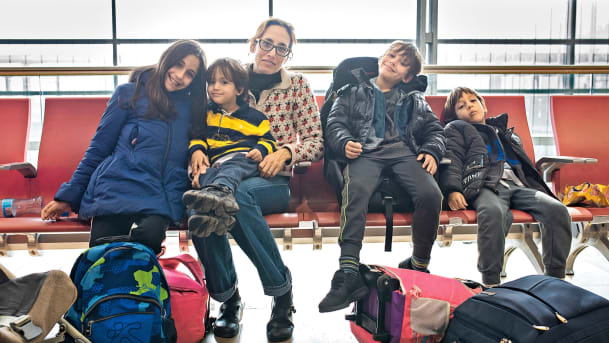Michal Doron Gean, 44, and from left: Mindi, 11, Joseph, 3, Uriel, 5 and Malchiel, 7; live in Panama City, flying to Florence.
This week at the Tel Aviv airport ? Meet the Gean family: She’s from Israel, he’s from Italy. They met in Japan, and they live in Panama with their five kids.
Hello, can I ask what you’ll be doing in Italy?
Michal: My husband is from Florence, so we’re going there for two days and then back home to Panama. We’ve lived in Panama for 11 years.
Sounds pretty exotic.
Michal: My husband’s father founded a company there and asked us to come. It turns out there’s a large Jewish community. The children go to a Jewish school. It’s fun in Panama.
How was Israel?
Michal: Charming. My husband and I have family here; we came to see them. We usually visit every two years.
Mindi, do you remember your earlier visits here?
Mindi: No, my brain is blank, but I do remember we went to a pool. This time we didn’t go.
Michal: This is the first time we’ve visited in winter. We even had to buy coats for the children, because in Panama it’s hot all the time. My family lives in Timrat [in northern Israel], and now the anemones and cyclamens are in bloom – flowers the children don’t know.
Mindi: We just walked and walked. It was a little boring.
What do you like doing?
Mindi: Playing in the pool. I don’t like the sea because it’s cold and there are fish. We were taken to see tanks; I liked climbing on them.
Michal: My father took us to Latrun, to the tanks [at the Armored Corps Museum].
Mindi: There were ants all over them. I really had a good time in Israel; I loved playing with my cousins.
Cousins are fun.
Mindi: I have a lot of aunts and uncles and cousins here; I didn’t even get to meet them all – my grandpa has eight brothers and sisters. And I also really improved my Hebrew.
What language do people speak in Panama?
Michal: Spanish. The children speak four languages: Spanish, English, Hebrew with me and Italian with my husband.
Did you meet your husband in Israel or Italy?
Michal: We actually met in Tokyo. I was in Japan on a post-army trip and I stayed to go to university.
Isn’t it awfully hard to study in Japanese?
Michal: It was hard, but I did it. Then I did four years of electronics at a Japanese university.
Hard-core.
Michal: Back then there were no foreigners, and if there were, they were Chinese. The closest ones to me were students from Saudi Arabia. Japan is a different planet.
In what way?
Michal: Many times I found myself just watching the way things are served, how people behave even on public transportation, how people work. Let’s say you forgot a bag somewhere – you’ll go back hours later and find it in the same place or at the local police station. It was really terrific. But I’m not sure I’d do it again.
Why?
Michal: Because even after I could speak Japanese I wasn’t accepted; I remained a foreigner. The Japanese are very insular. Sometimes it seems they’re not nice, but it’s not like that. They keep their distance because they believe it’s wrong to intervene.
Sounds like a way to be alone.
Michal: After university there was a period when I no longer had friends in Japan who spoke Hebrew, and I felt alone. That’s how I got to a Chabad House. It was always walking distance from where I lived, but it took me seven years to get there. My husband would go there regularly, but the first time I went he was on a visit to Italy. Everyone told me, “There’s someone you have to come back to meet, you’re a perfect match.”
And were they right?
Michal: Absolutely.
Fast-forward to four children later.
Five – I have another son, Ariel; he went with his dad to return the car.
For someone traveling with five children and 10 suitcases, you seem pretty calm.
Michal: Sometimes it’s chaotic, but fun. You just have to accept it. We like being together.
Kids, do you miss home?
Mindi: I get to Panama, go to sleep, and as soon as I wake up – school.
Malchiel: Not fun.
Mindi: I don’t want to go. I want to stay here.
